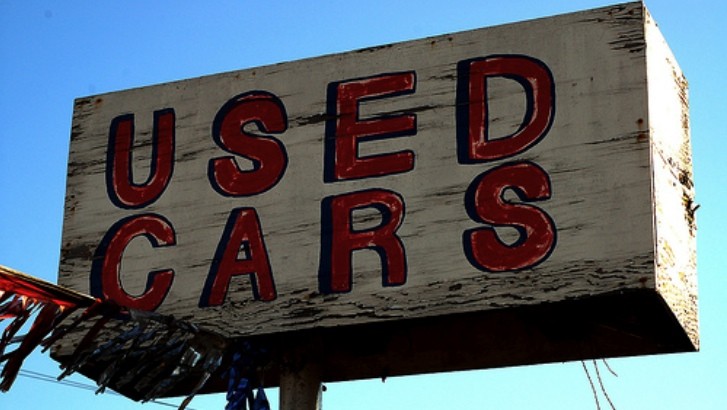After analyzing 50 million used cars for sale by dealers from January 2012 to May 2014, a recent study from iSeeCars.com points out that low-priced vehicles are more prone to potential scams than second-hand cars bearing a higher sticker price.
We've all heard or seen with our own eyes dirt cheap vehicles sitting in the parking lot of dubious second-hand dealerships. But you should thread with maximum caution if you're to take the path of paying $3,000 for an old ride that seems to be in good shape. Seems…
Those 50 million second-hand vehicles advertised at way too little money were analyzed over the last two and a half years, with some 75 percent of them coming from dealers located in the United States. After all the data was gathered and patterns have been identified, researchers found out that a used car priced over $12K has a 0.3 percent chance of being a potential fraud.
On the other end of the scale, cars priced under $5,000 are 7.3 times more likely to be so at 2.2 percent chance. But the most worrying fact is that dirt cheap sub-$3,000 motors have been identified to have the the greatest odds of being too good to be true at 5 percent chance of being a potential fraud. That translates to 16 times more chances for the car to hide an undisclosed issue than a vehicle priced above $12,000.
Other facts second-hand buyers might be interested in is that 50 percent of used vehicles priced under $10,000 may be potential scams. Further more, a much greater likelihood of too good to be true listings come from small dealers. The study also tells a well known fact among people that at some point bought a second-hand car - vehicles that are older than 10 years or have over 100k miles on the odometer are more likely to be scams.
According to iSeeCars' co-founder and CEO, Mr. Phong Ly, “it may be that dealers think they are more likely to get away with cheating people who are looking for lower price vehicles. We found examples of cars being advertised for much less than their market value or what they’re worth."
Mr. Ly, who also led the study, also mentions that "the dealer’s hope is to lure the potential buyer into the dealership in an attempt to sell them a different car or the same car but on an expensive financing plan. It may also be that the advertised car has some major undisclosed issue or it could be odometer fraud."
In order to prevent a potential scam, you should first do some online research about the fair market price of the vehicle you're interested in. Don't be afraid of asking the seller delicate questions about the car's history or faults. Secondly, have a look through the vehicle's history report for potential odometer fraud. If that's too much, check the oil change sticker to see if the mileage posted corresponds with what the clock shows. Last but not least, it's the wise man's choice to bring an independent mechanic along to inspect the car for any potential problems the dealer "forgot" to tell you about.
Those 50 million second-hand vehicles advertised at way too little money were analyzed over the last two and a half years, with some 75 percent of them coming from dealers located in the United States. After all the data was gathered and patterns have been identified, researchers found out that a used car priced over $12K has a 0.3 percent chance of being a potential fraud.
On the other end of the scale, cars priced under $5,000 are 7.3 times more likely to be so at 2.2 percent chance. But the most worrying fact is that dirt cheap sub-$3,000 motors have been identified to have the the greatest odds of being too good to be true at 5 percent chance of being a potential fraud. That translates to 16 times more chances for the car to hide an undisclosed issue than a vehicle priced above $12,000.
Other facts second-hand buyers might be interested in is that 50 percent of used vehicles priced under $10,000 may be potential scams. Further more, a much greater likelihood of too good to be true listings come from small dealers. The study also tells a well known fact among people that at some point bought a second-hand car - vehicles that are older than 10 years or have over 100k miles on the odometer are more likely to be scams.
According to iSeeCars' co-founder and CEO, Mr. Phong Ly, “it may be that dealers think they are more likely to get away with cheating people who are looking for lower price vehicles. We found examples of cars being advertised for much less than their market value or what they’re worth."
Mr. Ly, who also led the study, also mentions that "the dealer’s hope is to lure the potential buyer into the dealership in an attempt to sell them a different car or the same car but on an expensive financing plan. It may also be that the advertised car has some major undisclosed issue or it could be odometer fraud."
In order to prevent a potential scam, you should first do some online research about the fair market price of the vehicle you're interested in. Don't be afraid of asking the seller delicate questions about the car's history or faults. Secondly, have a look through the vehicle's history report for potential odometer fraud. If that's too much, check the oil change sticker to see if the mileage posted corresponds with what the clock shows. Last but not least, it's the wise man's choice to bring an independent mechanic along to inspect the car for any potential problems the dealer "forgot" to tell you about.

